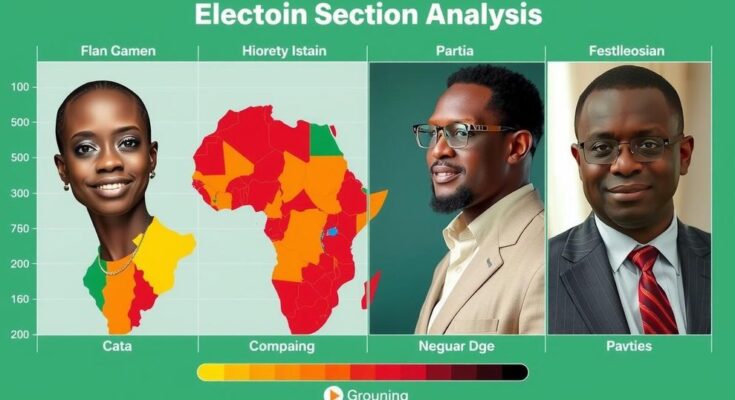The Ghanaian elections of 2024 resulted in the defeat of the NPP, signaling voter dissatisfaction attributed to economic mismanagement, high inflation, and corruption. Despite previous achievements, public sentiment favored John Mahama of the NDC, resulting in the loss of significant parliamentary seats. This outcome reflects a growing trend in African politics where economic crises lead to substantial shifts in power.
The recent elections in Ghana have led to the defeat of the ruling New Patriotic Party (NPP) after nearly eight years in power. Traditionally, no party has maintained a grip on governance for over this duration since the establishment of the Fourth Republic in 1992. During the campaign, the NPP aimed to “break the eight”; however, economic hardships and public dissatisfaction ultimately favored John Mahama of the National Democratic Congress (NDC). While the NPP emphasized achievements such as free senior high school education and digitalization, the electorate was predominantly concerned about high inflation, unemployment, and economic mismanagement.
Despite their achievements, citizens expressed severe frustration over the economic crisis, which saw inflation peak at 54% and unemployment rates affect the youth disproportionately, with a notable segment of the population suffering from high living costs, job scarcity, and government corruption allegations. Notably, pre-election surveys consistently indicated a significant dissatisfaction with the NPP’s performance, particularly among first-time voters and in swing regions, which would ultimately contribute to their defeat.
The NPP’s losses in parliamentary seats, including that of various high-profile ministers, reflected the changing political landscape. The NDC managed to reclaim vital regions such as Central and Greater Accra, further emphasizing the growing popularity of Mahama versus Dr. Bawumia, who couldn’t resonate with the populace. As a consequence of these election results, the NPP not only suffered in presidential votes but also saw a noticeable drop in parliamentary representation as Ghanaians signaled a desire for change amid previously mentioned crises. The outcome of this election underscores a significant political shift within Ghana, suggesting broader trends across Africa where ruling parties have been ousted due to similar economic and governance challenges.
The political climate in Ghana has been analyzed in light of electoral results that highlight broader concerns regarding governance and public welfare. The NPP’s fall after their attempt to secure a third consecutive term amid economic turmoil demonstrates a growing trend among African nations facing similar electoral shifts. This trend examined the role of economic factors, government accountability, and public service delivery, showcasing the essential elements that influenced voter behavior in the 2024 elections. The pressures of inflation and high unemployment alongside issues of perceived corruption within the government played a crucial role in shaping voter sentiment and action in a country that has historically shown patterns of political change under distressing economic conditions.
In conclusion, the 2024 Ghanaian elections marked a significant turning point, characterized by the defeat of the ruling NPP amid widespread economic discontent and public demand for accountability. The failure of the NPP to adequately address critical issues such as inflation, unemployment, and corruption, coupled with effective campaigning by the NDC under John Mahama, paved the way for a substantial electoral shift. The results not only illustrate the electorate’s desire for a change in leadership but also reflect a wider trend across Africa, where ruling parties have been increasingly challenged by citizens seeking relief from persistent economic hardships.
Original Source: www.bbc.com




